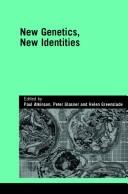| Listing 1 - 2 of 2 |
Sort by
|

ISBN: 9781134161188 1280710497 9786610710492 0203962923 0415394074 1138010464 1134161182 9780203962923 9781134161133 9781134161171 9780415394079 9781138010468 1134161174 Year: 2017 Publisher: Abingdon, Oxon ; New York, NY : Routledge,
Abstract | Keywords | Export | Availability | Bookmark
 Loading...
Loading...Choose an application
- Reference Manager
- EndNote
- RefWorks (Direct export to RefWorks)
What implications are applications of new genetic technologies in biomedicine having on social identity in today's society? New Genetics, New Identities, a wide-ranging multi-disciplinary volume in the CESAGen Genetics & Society Book series, presents not only theoretical reflection but also empirical case studies drawn from an international array of authors. Including the highly controversial areas of reproductive technologies and use of human embryos in biomedical research, other key features include:a fresh analysis of a wide-range of
Genetics --- Medical technology --- Moral and ethical aspects. --- Health care technology --- Health technology --- Technology --- genographic --- project --- medicine --- condition --- clinical --- geneticists --- human --- genome --- post-genomic --- science
Book
ISBN: 022634987X 9780226349879 9780226347325 022634732X Year: 2016 Publisher: Chicago
Abstract | Keywords | Export | Availability | Bookmark
 Loading...
Loading...Choose an application
- Reference Manager
- EndNote
- RefWorks (Direct export to RefWorks)
Personal genomics services such as 23andMe and Ancestry.com now offer what once was science fiction: the ability to sequence and analyze an individual's entire genetic code-promising, in some cases, facts about that individual's ancestry that may have remained otherwise lost. Such services draw on and contribute to the science of human population genetics that attempts to reconstruct the history of humankind, including the origin and movement of specific populations. Is it true, though, that who we are and where we come from is written into the sequence of our genomes? Are genes better documents for determining our histories and identities than fossils or other historical sources? Our interpretation of gene sequences, like our interpretation of other historical evidence, inevitably tells a story laden with political and moral values. Focusing on the work of Henry Fairfield Osborn, Julian Sorell Huxley, and Luigi Luca Cavalli-Sforza in paleoanthropology, evolutionary biology, and human population genetics, History Within asks how the sciences of human origins, whether through the museum, the zoo, or the genetics lab, have shaped our idea of what it means to be human. How have these biologically based histories influenced our ideas about nature, society, and culture? As Marianne Sommer shows, the stories we tell about bones, organisms, and molecules often change the world.
Natural history --- Evolution (Biology) --- Evolutionary genetics --- History. --- anatomy, bones, organism, molecules, science, personal genomics, 23andme, genetics, human population, ancestry, research, progress, cultural transmission, heritage, diversity, genographic project, ecology, humanism, wwf, iucn, unesco, london zoo, evolution, luigi luca cavalli-sforza, julian sorell huxley, museum, henry fairfield osborn, natural history, origins, species, fossils, evolutionary biology, paleoanthropology, nonfiction.
| Listing 1 - 2 of 2 |
Sort by
|

 Search
Search Feedback
Feedback About UniCat
About UniCat  Help
Help News
News